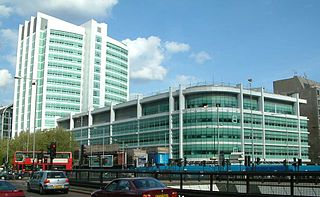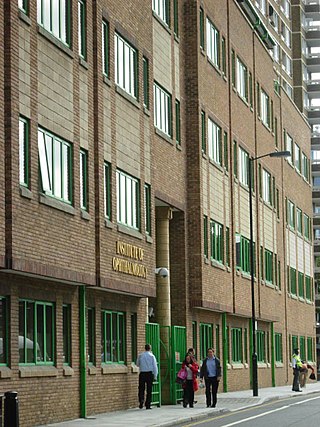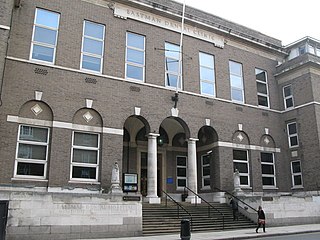Related Research Articles
University College London is a public research university in London, England. It is a member institution of the federal University of London, and is the second-largest university in the United Kingdom by total enrolment and the largest by postgraduate enrolment.

University College Hospital (UCH) is a teaching hospital in the Fitzrovia area of the London Borough of Camden, England. The hospital, which was founded as the North London Hospital in 1834, is closely associated with University College London (UCL), whose main campus is situated next door. The hospital is part of the University College London Hospitals NHS Foundation Trust.

The Wellcome Trust is a charitable foundation focused on health research based in London, United Kingdom. It was established in 1936 with legacies from the pharmaceutical magnate Henry Wellcome to fund research to improve human and animal health. The aim of the Trust is to "support science to solve the urgent health challenges facing everyone." It had a financial endowment of £29.1 billion in 2020, making it the fourth wealthiest charitable foundation in the world. In 2012, the Wellcome Trust was described by the Financial Times as the United Kingdom's largest provider of non-governmental funding for scientific research, and one of the largest providers in the world. According to their annual report, the Wellcome Trust spent GBP £1.1 billion on charitable activities across their 2019/2020 financial year. According to the OECD, the Wellcome Trust's financing for 2019 development increased by 22% to US$327 million.

The Wellcome Library is a free library and Museum based in central London. It was developed from the collection formed by Sir Henry Wellcome (1853–1936), whose personal wealth allowed him to create one of the most ambitious collections of the 20th century. Henry Wellcome's interest was the history of medicine in a broad sense and included subjects such as alchemy or witchcraft, but also anthropology and ethnography. Since Henry Wellcome's death in 1936, the Wellcome Trust has been responsible for maintaining the Library's collection and funding its acquisitions. The library is free and open to the public.
UCL Medical School is the medical school of University College London (UCL) and is located in London, United Kingdom. The school provides a wide range of undergraduate and postgraduate medical education programmes and also has a medical education research unit and an education consultancy unit. It is internationally renowned and is currently ranked 6th in the world by the QS World University Rankings for Medicine 2023.
Geraint Ellis Rees is Vice-Provost of research, innovation & global engagement at University College London (UCL). Previously he served as Dean of the UCL Faculty of Life Sciences, UCL Pro-Provost, Pro-Vice-Provost (AI) and a Professor of Cognitive Neurology at University College London. He is also a Director of UCL Business, a trustee of the Alan Turing Institute, a trustee of the Francis Crick Institute and a trustee of the Guarantors of Brain.
Harold John Cook is John F. Nickoll Professor of History at Brown University and was director of the Wellcome Trust Centre for the History of Medicine at University College, London (UCL) from 2000 to 2009, and was the Queen Wilhelmina Visiting Professor of History at Columbia University in New York during the 2007–2008 academic year.
University College London Hospitals NHS Foundation Trust (UCLH) is an NHS foundation trust based in London, United Kingdom. It comprises University College Hospital, University College Hospital at Westmoreland Street, the UCH Macmillan Cancer Centre, the Royal National ENT and Eastman Dental Hospitals, the Hospital for Tropical Diseases, the National Hospital for Neurology and Neurosurgery, the Royal London Hospital for Integrated Medicine and the Royal National Throat, Nose and Ear Hospital.
The UCL Ear Institute is an academic department of the Faculty of Brain Sciences of University College London (UCL) located in Gray's Inn Road in the Bloomsbury district of Central London, England, previously next to the Royal National Throat, Nose and Ear Hospital, the UK's largest ear, nose and throat hospital until it closed in 2019.
The UCL Centre for the History of Medicine (UCLCHM) was an academic research and teaching centre for the history of medicine at University College London (UCL) in London. It succeeded the Wellcome Trust Centre for the History of Medicine at UCL. The UCLCHM was founded in 2011, and from September 2011, it took over some of the former staff of the Wellcome Trust Centre at UCL, including four emeritus academic staff, six teaching staff, and associated staff in a number of other UCL departments.
Vivian Nutton FBA is a British historian of medicine.

The UCLH Biomedical Research Centre is a biomedical research centre based in London. It is a partnership between University College London Hospitals NHS Foundation Trust (UCLH), University College London (UCL) the National Institute for Health and Care Research (NIHR) and UCLPartners. It was one of the original five Comprehensive Biomedical Research Centres established by the NIHR in April 2007.

The UCL Institute of Ophthalmology is an institute within the Faculty of Brain Sciences of University College London (UCL) and is based in London, United Kingdom. The institute conducts research and post-graduate teaching in the area of ophthalmology.

The UCL Eastman Dental Institute is the dental school of University College London (UCL) and an academic department of UCL's Faculty of Medical Sciences. The institute is based on Gray's Inn Road in the Bloomsbury district of London, United Kingdom, adjacent to the Eastman Dental Hospital, with which it is closely associated.

The UCL Queen Square Institute of Neurology is an institute within the Faculty of Brain Sciences of University College London (UCL) and is located in London, United Kingdom. Together with the National Hospital for Neurology and Neurosurgery, an adjacent facility with which it cooperates closely, the institute forms a major centre for teaching, training and research in neurology and allied clinical and basic neurosciences.
Sir Peter Stanley Harper was a British physician and academic who was University Research Professor (Emeritus) in Human Genetics at Cardiff University. His work focused on researching neurogenetics and has resulted in discoveries concerning muscular dystrophies and Huntington's disease. He was knighted in 2004 for services to medicine.

The Wolfson Institute for Biomedical Research at UCL is an academic department of the Faculty of Biomedical Sciences of University College London located in London, United Kingdom. The Institute is situated in the Cruciform Building, formerly the main building of University College Hospital, in the Bloomsbury district of Central London.
The Wellcome Institute for the History of Medicine (1968–1999) was a London centre for the study and teaching of medical history. It consisted of the Wellcome Library and an Academic Unit. The former was and is a world-class library collection owned and managed by the Wellcome Trust and staffed by librarians including academic librarians who held honorary lectureships at University College London. The Academic Unit was a group of university staff appointed at University College London that conducted a programme of university teaching, thesis supervision, seminars, conferences and publications.
The History of Modern Biomedicine Research Group (HoMBRG) is an academic organisation specialising in recording and publishing the oral history of twentieth and twenty-first century biomedicine. It was established in 1990 as the Wellcome Trust's History of Twentieth Century Medicine Group, and reconstituted in October 2010 as part of the School of History at Queen Mary University of London.
Catherine J. "Cathy" Price is a British neuroscientist and academic. She is Professor of Cognitive Neuroscience and director of the Wellcome Trust Centre for Neuroimaging at University College London.
References
- ↑ "History of the Wellcome Library". Wellcome Library. Retrieved 12 March 2015.
- ↑ Symons, John (1993). Wellcome Institute for the History of Medicine. A Short History. London: The Wellcome Trust. ISBN 1-869835-34-4 . Retrieved 12 March 2015.
- 1 2 "Announcement of Centre closing". UCL website. Retrieved 12 March 2015.
- ↑ "Announcement of closure". Medical Museion. Retrieved 12 March 2015.
- ↑ "Highlights 2010". Wellcome Trust Centre for the History of Medicine at UCL. Retrieved 12 March 2015.
- ↑ "Publications". Wellcome Trust Centre for the History of Medicine. Archived from the original on 14 October 2009. Retrieved 12 March 2014.
- ↑ "The Wellcome Institute. A Brief Historical Sketch". Archive.org. The Wellcome Institute. 20 April 1983. Retrieved 12 March 2015.
- ↑ "Wellcome Library website" . Retrieved 12 March 2015.
